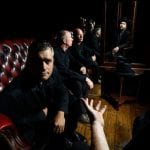
The first time I saw Elliott Brood, they were live on a side stage at Pickathon, outside of Portland, OR. Three guys making the largest full-band sound I reckoned I’d heard in some time. Sitting there, trying to extrapolate individual sounds (as I tend to at least try to do), was difficult. Sure, there was the strummy banjo that often started the song. But then the band would hit, and it was like they were channeling the thunder and the rain and the wind itself, to sweep up the hill and fill all our senses. I couldn’t tell what they were singing about, but it didn’t really matter at the time. These guys were onto something.
I’ve seen them a handful of times since – at Seattle bars and during one ND party at South by Southwest – and have seen them grow by leaps and bounds each time. So, it was with great anticipation that I opened their new album Work and Love. To hear Sasso tell it, the album is a “lament for youth… growing up in general, having relationships that fall by the wayside.” We’ve all been there – that arresting moment where a glance in the mirror declares how much life has changed in the growing up, in all the good and letting-go sorts of ways.
Indeed, Work and Love, the title alone, encapsulates two of the most “adult” things one must embrace in order to let go of the hubris of youth. The disc’s opening track goes even further, repeating almost like a mantra – the way a mantra starts as an attempt to teach you something and, through repetition, becomes a reminder, a grounding, a vehicle for moving forward:
Little ones
Working so fast at growing old
You should all stay little ones
We should all stay little ones…
By the time this refrain closes out the song (alternating from “you” to “we,” back and forth, over and over), it’s less a wish to remain actually physically and mentally young, and more a determination to never lose the simple joys of a youthful heart. It is, then, in its own way, a growing up.
For this band, growing up has meant expanding their following, traveling the world (one of their best shows, Sasso told me, was recently, in Spain, in front of a packed house, opening for the Lumineers and the Black Keys). It’s also meant the distinct honor of winning a Juno. “I don’t think it changed anything, really,” he said. “It’s nice to be acknowledged and have that [support] behind you, from your peer group, but it doesn’t change anything.”
Of course, if anything has changed within the band, it’s a greater proficiency for finding the lyrics that hit as hard — and as big — as the music itself.
And, musically, Work and Love is equal parts country and modern rock and roll. “Mission Bell” sounds a little like Depeche Mode meets the Sadies, with some strange almost Morphine-esque horns. But then that guitar solo happens, thick on the twang and sliding like it’s being played using the neck of a PBR. The very next song (“Jigsaw Heart”) with its joyful “ohs” and hand claps, betrays their heavy Jayhawks influence. It’s all over the Americana map.
“The Americana genre,” says Sasso, before jumping ahead. “Neil young: Canadian. Joni Mitchell: Canadian. Leonard Cohen: Canadian. I think we have a big part in that… We drive through all the same landscape [as American artists] … you have the Appalachian mountains, and they extend into Canada. We just write about our lives … I don’t think we have a Canadian aspect of things. I think it’s more North American. We delve into the exact same things.”
Indeed, Work and Love sounds like it could just as well have sprung from the northernmost reaches of the American heartland, out of someone’s garage on a grey and ice-stormy January night, neighbors a mile away. Three guys making big sounds, singing their hearts out, clapping their hands, and — regrettingly, embracingly — waving their youth goodbye.



